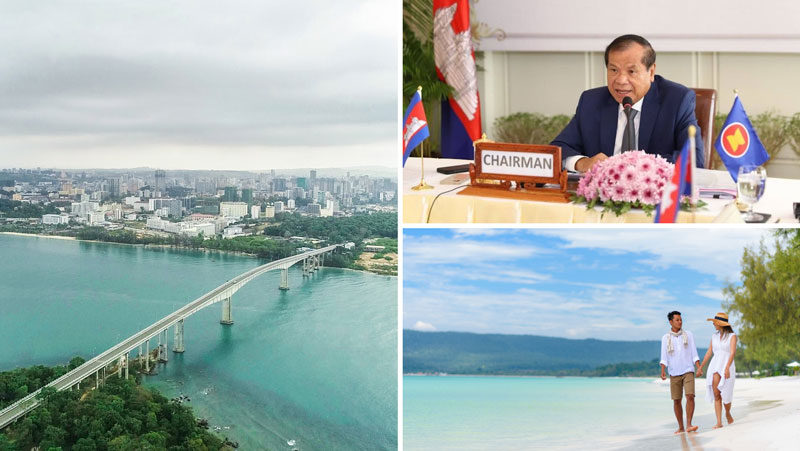
Cambodia’s Ambitious Tourism Roadmap
Ahead of the Mekong Tourism Forum in Preah Sihanoukville 26 April, Cambodia’s, Minister of Tourism, Mr Thong Khon outlines his country’s targets for tourism, aviation and dispersing a new generation of visitors beyond Angkor Wat and Phnom Penh
What are your targets for Cambodian’s tourism in 2023?
The target for Cambodia’s tourism in 2023 is to increase the international tourist arrivals from 4.0 to 4.5 million. Cambodia is host of the Southeast Asian Games 2023 in May, a major tourist event.
Is there a new emphasis or focus in Cambodia’s 2023 tourism promotion campaigns?
Our focus is “Visit Cambodia Year 2023”. It has the theme “MICE and Sports” and the slogan “Every Day is A Wonder”. Apart from the SEA Games we also have the 12th ASEAN Para Games from 3-9 June in Phnom Penh, with the theme, “Sports Live In Peace”. There’s also the Mekong Tourism Forum 2023 in Sihanoukville from 25-27 April on “Rethinking for Resilience and Digitalization”. Moreover, Cambodia is organising historical new year celebrations in Siem Reap province, “the 10th Anniversary of Angkor Sankranta,” 14-16 April.
How has tourism in Cambodia changed since the pandemic?
Like many other countries, Cambodia faced a big challenge from the global Covid-19 pandemic. The number of international arrivals dropped from 6.6 million in 2019 to 1.3 million in 2020 and to only 200,000 in 2021. With tourism coming back there have been some positives:
Cambodia has been awarded “Asia’s Leading Culture Destination 2022” and “Asia’s Leading Youth Travel Destination 2022” in the World Travel Awards, held during the International Travel Expo in Ho Chi Minh City.
On 17 March this year, the Ministry of Tourism of the Kingdom of Cambodia won the “Leading International Tourism Campaign 2022” with its Visit Cambodia NEXT (New Exciting eXperience and Taste) campaign. We also organised roadshows in ASEAN markets such as the Philippines, Indonesia and Vietnam and participated in international tourism exhibitions both virtually and physically.
Moreover, Cambodia became the first country in ASEAN to fully re-open for international travellers in October 2022. That helped bring the number of international arrivals to 2.23 million by the end of 2022. Cambodia expects to receive around four million international visitors by the end of 2023, five million in 2024 and seven million in 2025. We have also seen strong domestic tourist demand within Cambodia.
We developed new tourism infrastructure during the pandemic, such as 38 new roads in Siem Reap, the Phnom Penh-Sihanoukville expressway, and the new Siem Reap International Airport, which is due for completion in Q3 this year. The new Techo Takhmao International Airport south of Phnom Penh is due to complete its first phase in mid 2024.
What changes to the aviation sector are you trying to encourage to boost Cambodia Tourism?
By March 2028 we plan to have 33 airlines connecting to Cambodia through three international airports with an average of 494 flights per week or 988 movements. The government aims to boost the influx of international tourists and new airlines by applying tax incentives and reducing or waiving landing fees. We are investing a lot in two new airports: Kandal province, just south of Phnom Penh, and Siem Reap.
Which policies do you have in place to disperse tourism away from Angkor Wat to other parts of Cambodia?
Initially, foreign tourists visiting Cambodia wished to see only Angkor Wat temple. Through the preparation of new tour packages, tourists are now starting to enjoy more nature tourism, adventure activities, community-based tourism, ecotourism and learning about the lives of people and local food. We want to attract tourists away from Angkor Wat to help poorer areas develop.
What role does the upcoming Mekong Tourism Forum in Preah Sihanouk, play in Cambodia’s tourism future?
The Mekong Tourism Forum plays a vital role where we discuss the critical issues and emerging trends among regional tourism stakeholders. With the theme Rethinking for Resilience and Digitalisation, forum attendees will discuss sustainable food systems, fostering women’s empowerment, accelerating digitalisation, and upskilling the tourism workforce.
What message do you have for tourism leaders and delegates attending the forum?
Let’s work warmly and closely together to discuss regional issues and create solutions for further cooperation on sustainable tourism development. We can do this by promoting tourism potential and more disbursed destinations among the six countries of the Greater Mekong Subregion.
